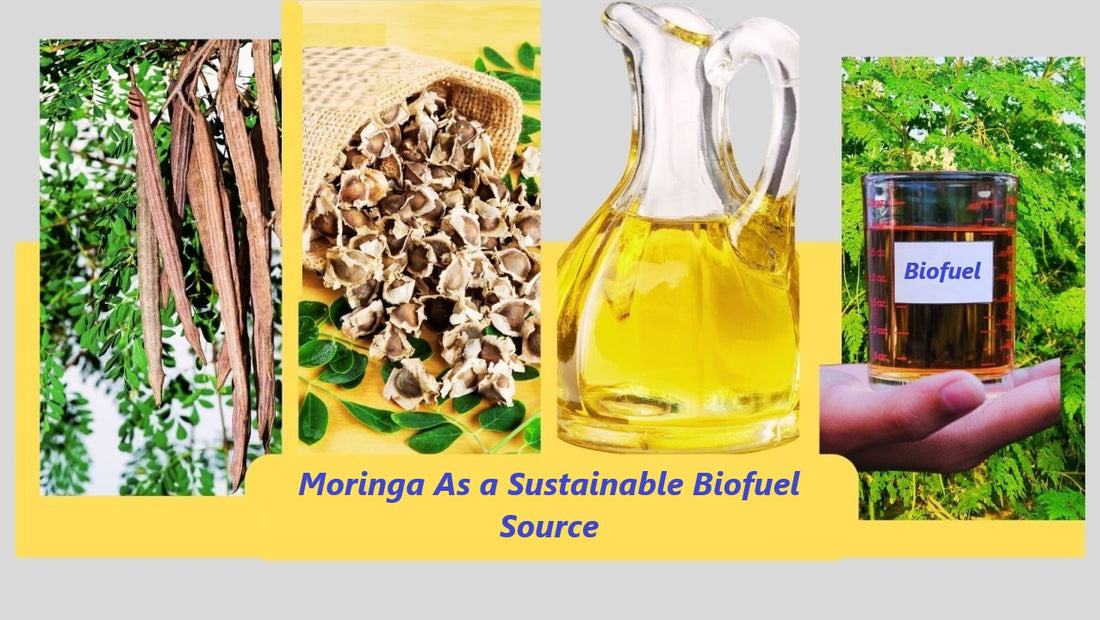In the quest for sustainable and renewable energy sources, Moringa Oleifera, widely acclaimed for its nutritional and medicinal properties, is emerging as a promising candidate in the biofuel industry. Known as the "Miracle Tree," Moringa's high oil yield and rapid growth rate offer an innovative solution to the global energy crisis, positioning it as a key player in the green revolution. This article explores the potential of Moringa in biofuel production, examining its benefits, challenges, and the future prospects of transforming this superfood into a super fuel.
The Potential of Moringa in Biofuel Production
High Oil Yield: The Cornerstone of Moringa's Biofuel Promise
Seed Oil Content: A Rich Source of Biodiesel
Moringa Oleifera seeds are a goldmine of oil, boasting an impressive oil content of approximately 30-40%. This high oil yield positions Moringa as an exceptional candidate for biodiesel production. The oil extracted from Moringa seeds is of high quality, with properties that make it suitable for conversion into biodiesel through established processing techniques. This biodiesel is not only renewable but also burns cleaner than conventional diesel, offering a greener alternative for energy needs.
Rapid Growth and Harvest Cycle: Ensuring a Sustainable Supply
One of the most remarkable attributes of the Moringa tree is its rapid growth rate and the ability to be harvested multiple times within a single year. This ensures a continuous and reliable supply of seeds for oil extraction, making Moringa a sustainable source of raw material for biodiesel production. The tree's resilience and adaptability to various climates further enhance its suitability for widespread cultivation, promising a steady stream of biofuel supply without the seasonal limitations typical of many other biofuel sources
Environmental Benefits: A Sustainable Energy Solution
Reduced Carbon Footprint: Contributing to Climate Change Mitigation
The adoption of Moringa-based biofuel represents a significant step forward in reducing the carbon footprint of energy production. Unlike fossil fuels, which release large amounts of carbon dioxide—a greenhouse gas contributing to global warming—Moringa biodiesel emits considerably lower levels of carbon emissions. This shift towards Moringa-based biofuel can play a crucial role in mitigating climate change by decreasing the reliance on fossil fuels and promoting cleaner, renewable sources of energy.
Soil and Water Conservation: Promoting Eco-Friendly Cultivation
Moringa's ability to thrive in marginal soils not only expands its potential for cultivation in diverse environments but also contributes to soil and water conservation. By growing Moringa in areas unsuitable for other crops, valuable arable land is preserved for food production, while still producing a viable biofuel source. Moreover, Moringa's efficient water usage and its role in soil improvement through leaf litter make it an environmentally friendly option for biofuel cultivation. This aspect of Moringa cultivation underscores its potential to support sustainable agricultural practices and land management strategies.
Innovations in Moringa Biofuel Production
Advanced Extraction and Processing Techniques
The journey of transforming Moringa Oleifera into a viable biofuel source encompasses innovative extraction and processing techniques designed to maximize efficiency and sustainability. These methods not only ensure the preservation of the oil's quality but also facilitate the integration of Moringa biodiesel into existing energy systems, marking a significant advancement in renewable energy technologies.
Cold Press Extraction: A Sustainable Approach to Oil Extraction
- Preserving Nutritional Integrity: The cold press extraction method is instrumental in maintaining the nutritional integrity and therapeutic properties of Moringa oil. By avoiding high temperatures and chemical solvents, this method ensures that the oil retains its full spectrum of beneficial fatty acids, antioxidants, and vitamins.
- Environmental Considerations: This eco-friendly extraction technique minimizes environmental impact, aligning with the global shift towards greener, more sustainable production practices. It eliminates the need for harmful chemicals and reduces energy consumption, contributing to a cleaner production process.
Transesterification Process: The Chemical Transformation into Biodiesel
- Efficient Conversion: Transesterification is a critical step in converting Moringa oil into biodiesel, a process that involves reacting the oil with an alcohol (usually methanol) in the presence of a catalyst (such as sodium hydroxide). This reaction results in the production of biodiesel and glycerol, a valuable byproduct used in various industries.
- Optimizing Biodiesel Quality: Through careful control of the reaction conditions, including temperature, alcohol-to-oil ratio, and catalyst concentration, the transesterification process can be optimized to produce high-quality biodiesel that meets or exceeds industry standards for fuel performance and emissions.
Integration with Existing Energy Systems
Compatibility with Diesel Engines: Seamless Integration into Current Infrastructures
- Direct Use in Diesel Engines: One of the most compelling advantages of Moringa biodiesel is its compatibility with existing diesel engines. This feature allows for the direct use of Moringa biodiesel in vehicles and machinery without the need for costly modifications, facilitating a smoother transition to renewable energy sources within the transportation sector.
- Promoting Sustainable Transportation: The ability to utilize Moringa biodiesel in standard diesel engines positions it as a practical, accessible alternative to fossil fuels, promoting the adoption of cleaner, more sustainable transportation solutions.
Blending with Conventional Fuels: Enhancing Fuel Sustainability
- Flexible Fuel Blending: Moringa biodiesel can be blended in various proportions with petroleum diesel, offering flexibility in its use and enabling a gradual shift towards more sustainable fuel options. These blends, known as B20 (20% biodiesel, 80% petroleum diesel) or B100 (100% biodiesel), provide varying levels of environmental benefits and performance characteristics.
- Reducing Dependency on Fossil Fuels: The practice of blending Moringa biodiesel with conventional fuels not only reduces the overall carbon footprint of transportation but also decreases reliance on dwindling fossil fuel reserves. It represents a balanced approach to integrating renewable energy sources into the existing fuel supply, paving the way for a more sustainable energy future.
Challenges and Solutions in Moringa Biofuel Development
Scaling Production and Ensuring Sustainability
The potential of Moringa Oleifera as a biofuel source is immense, yet realizing this potential on a global scale requires careful consideration of agricultural practices and supply chain management to ensure sustainability and economic viability.
Agricultural Practices: The Foundation of Sustainable Moringa Cultivation
- Sustainable Farming Techniques: Implementing sustainable farming practices such as crop rotation, organic pest control, and natural fertilization methods is crucial to maintain soil health and biodiversity. These practices help in preserving the ecological balance, preventing deforestation, and ensuring the long-term viability of Moringa cultivation.
- Water Conservation: Given Moringa's drought-resistant nature, it's essential to employ water-efficient irrigation techniques such as drip irrigation to optimize water use and minimize waste, contributing to the conservation of precious water resources.
Supply Chain Management: Streamlining Operations for Efficiency
- Harvesting and Processing: Developing standardized, efficient protocols for the harvesting and processing of Moringa seeds into oil ensures quality control and reduces waste. Automation and mechanization of these processes can enhance productivity and scalability.
- Logistics and Distribution: Establishing robust logistics frameworks to transport Moringa oil from farms to processing facilities and then to the market is vital. This includes investing in infrastructure and technology to track and optimize the supply chain, reducing delays and costs.
Economic Viability and Market Adoption
Cost-Effectiveness: Making Moringa Biofuel Competitive
- Reducing Production Costs: Continuous research and technological innovation in the extraction and processing of Moringa oil are essential to lower production costs. This includes improving seed yield per hectare, enhancing oil extraction efficiency, and streamlining the transesterification process.
- Economies of Scale: Scaling up Moringa biofuel production can lead to economies of scale, further reducing costs. This requires investment in larger cultivation areas, more extensive processing facilities, and broader market reach.
Policy and Incentives: Government Support for Moringa Biofuel
- Subsidies and Grants: Government subsidies and grants for research in Moringa biofuel production, as well as incentives for farmers to cultivate Moringa, can significantly boost the industry. This support can help offset initial setup costs and encourage more players to enter the market.
- Regulatory Frameworks: Implementing favorable regulatory frameworks that recognize and support biofuels as a sustainable energy source is crucial. Policies that mandate the blending of biofuels with conventional fuels can drive market adoption and consumer acceptance of Moringa biofuel.
The Future of Moringa in Green Energy
Research and Technological Advancements
Genetic Engineering: Enhancing Moringa's Potential
Advances in genetic engineering hold the key to unlocking Moringa Oleifera's full potential as a biofuel crop. By manipulating the genetic makeup of Moringa, scientists aim to create variants with higher oil yields and increased resistance to environmental stressors such as drought, pests, and diseases. This genetic optimization could lead to more robust Moringa crops that are not only more productive in terms of oil output but also more adaptable to varying climatic conditions, ensuring a reliable supply of raw material for biofuel production.
- Targeted Traits: Genetic engineering efforts focus on enhancing specific traits in Moringa, such as accelerated growth rates, higher seed mass, and improved oil content. Additionally, increasing the plant's resilience to abiotic stresses like extreme temperatures and soil salinity can significantly improve crop survival and productivity.
- Sustainable Cultivation: By developing genetically modified Moringa strains that require less water and are resistant to local pests, the environmental impact of cultivating Moringa on a large scale can be minimized, contributing to more sustainable biofuel production practices.
Process Optimization: Streamlining Biodiesel Production
The efficiency of converting Moringa oil into biodiesel is crucial for the economic viability and environmental sustainability of Moringa-based biofuels. Ongoing research in process optimization focuses on refining the transesterification process, which is the chemical reaction that converts Moringa oil into biodiesel and glycerol, to make it more efficient, cost-effective, and environmentally friendly.
- Innovative Techniques: Researchers are exploring novel catalysts, both homogeneous and heterogeneous, that could lower the reaction temperature and time, reduce the need for high-purity reactants, and simplify the purification of biodiesel.
- Waste Reduction: Efforts are also underway to minimize waste and by-products from the biodiesel production process. Finding uses for glycerol and other by-products, such as in the production of bioplastics or as additives in other industrial processes, can enhance the overall sustainability of Moringa biodiesel.
Global Impact and Sustainability Goals
Contribution to Renewable Energy Targets
Moringa biofuel represents a promising avenue for diversifying the global energy mix and achieving renewable energy targets. As countries around the world commit to reducing greenhouse gas emissions and transitioning to more sustainable energy sources, Moringa biofuel offers a viable alternative to fossil fuels, capable of significantly lowering carbon footprints and mitigating climate change.
- Renewable Energy Integration: The integration of Moringa biofuel into the existing energy infrastructure, including its use in transportation and power generation, can accelerate the shift towards renewable energy sources, contributing to global efforts to combat climate change.
Empowering Communities: Economic and Social Benefits
The cultivation of Moringa for biofuel production presents significant economic opportunities for rural communities, particularly in developing countries where Moringa is native or can be sustainably cultivated. By providing a source of income and promoting local industry, Moringa biofuel production can play a crucial role in poverty alleviation and sustainable development.
- Job Creation: The entire value chain, from cultivation and harvesting to processing and distribution, can generate employment opportunities in rural areas, helping to uplift communities and reduce poverty.
- Skill Development: Training programs related to Moringa cultivation, biofuel production, and business management can equip individuals with valuable skills, fostering entrepreneurship and contributing to the overall economic development of the region.
Conclusion:
Moringa Oleifera's journey from a nutritional powerhouse to a promising biofuel source illustrates the incredible versatility and potential of this "Miracle Tree." As the world seeks cleaner, more sustainable energy solutions, Moringa stands out as a beacon of hope, offering a path to a greener, more sustainable future. By overcoming challenges through innovation and collaboration, the potential of Moringa in biofuel production can be fully realized, marking a significant milestone in the quest for renewable energy sources. As we continue to explore and harness the power of Moringa, it becomes clear that this superfood may well be the super fuel of tomorrow, driving the green revolution forward.

